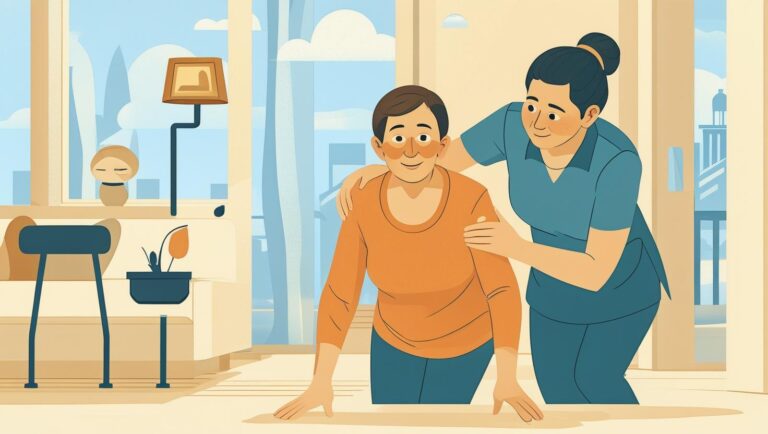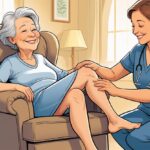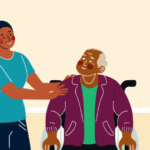How to Prevent Falls in the Elderly: Essential Tips for Family Caregivers

Falls are a major concern for the elderly, and the consequences can be devastating. Whether it’s a slip in the kitchen or a fall in the garden, the risk of injury is higher in older adults. For caregivers, knowing how to prevent falls in elderly loved ones is crucial to maintaining their safety and independence. This article will guide you through tips to prevent falls in the elderly while incorporating key strategies and practical advice that can make a significant difference.
Why Falls Are a Concern for the Elderly
As we age, the risk of falling increases due to various factors such as weakened muscles, reduced balance, and underlying health conditions. For elderly individuals, falls can lead to serious injuries like fractures, concussions, and a decrease in quality of life. In fact, falls are the leading cause of injury-related death among seniors, making fall prevention one of the most important aspects of elderly care.
At Health Next Door, we specialize in mobile physiotherapy to assist elderly individuals with fall prevention and rehabilitation. Our services help create personalized care plans that focus on strengthening muscles and improving mobility to reduce the risk of falls.
1. Create a Fall-Proof Environment at Home
One of the first steps in how to prevent falls in elderly at home is making sure their living environment is safe. A clutter-free and well-organized home can drastically reduce the likelihood of falls.
Remove tripping hazards: Clear the floors of objects like rugs, wires, or uneven flooring that may cause a trip.
Install grab bars: In bathrooms, near stairs, and in hallways, grab bars provide extra support.
Ensure proper lighting: Adequate lighting reduces the chances of stumbling in the dark.
Making these simple changes can create a safer environment and reduce the risk of falls in elderly individuals. If you’re unsure how to make these changes, consider booking a home physiotherapy consultation where our experts can help assess and recommend safety improvements.
2. Exercise: Building Strength and Balance
Regular exercises to prevent falls in the elderly are key to improving muscle strength and balance. Physical activity increases flexibility, coordination, and the ability to react quickly, all of which help in preventing falls. Some useful exercises include:
Tai Chi: This ancient Chinese practice is widely known for its ability to improve balance and flexibility.
Strength training: Building leg and core strength through resistance exercises helps in maintaining stability.
Balance exercises: Simple exercises like standing on one leg or walking heel-to-toe improve balance.
At Health Next Door, we offer aged care physiotherapy at home that includes customized exercise programs. Book a physiotherapy session today to help your loved one build strength and stability.
3. Choosing the Right Footwear
Wearing the right shoes is crucial for preventing falls in the elderly. Shoes to prevent falls in the elderly should have non-slip soles, provide good arch support, and fit properly. Avoid high heels, slippers, and shoes with smooth soles that can easily slip on floors. Well-fitting shoes reduce the risk of losing balance or slipping, especially on wet or slick surfaces.
For personalized recommendations on the best footwear for fall prevention, ask one of our mobile physiotherapists during your next visit.
4. Assistive Devices for Added Support
When learning how to prevent falls in elderly, assistive devices can play a significant role. There are several tools available to help seniors maintain balance and stability:
Walking aids: Canes, walkers, or rollators provide extra support, particularly when walking long distances or navigating uneven terrain.
Raised toilet seats and shower chairs: These assistive devices help prevent falls in the bathroom, a common area where elderly individuals fall.
Stair lifts and ramps: For those with mobility challenges, stair lifts and ramps are excellent tools to help avoid falls when navigating stairs.
We offer a variety of assistive devices through our NDIS physiotherapy services, ensuring that elderly individuals have the tools and support they need to maintain their independence while staying safe.
5. Managing Health Conditions and Medications
Certain health conditions and medications can increase the risk of falls. If an elderly person has dementia, for example, they may experience confusion or dizziness, which can lead to accidents. Regular check-ups and medication reviews are essential to managing health issues that may contribute to falling. For elderly individuals with dementia, ensure that they are supported during daily activities and have a structured routine to prevent disorientation.
Our mobile physiotherapy services for dementia patients focus on creating safe and engaging routines to improve physical and cognitive function. Learn more about how we can support your loved ones with dementia by visiting our dementia care page.
6. Hydration and Nutrition
Dehydration and poor nutrition can cause weakness and dizziness, making it easier to fall. Prevent falls in elderly by ensuring they stay well-hydrated and maintain a healthy diet. A diet rich in calcium, vitamin D, and protein will help keep their bones and muscles strong. Additionally, maintaining good hydration levels supports overall balance and reduces the chances of feeling lightheaded.
At Health Next Door, we provide holistic care that includes both physical therapy and guidance on improving diet and hydration for better mobility. Schedule a consultation to discuss how we can help manage your loved one’s health with a personalized care plan.
7. Regular Health Assessments
As part of strategies to prevent falls in elderly, it’s essential to have regular health assessments. This includes evaluating balance, strength, vision, and cognitive function. Physiotherapists can perform these assessments and provide specific exercises and advice tailored to the elderly individual’s needs. Early detection of any issues can lead to better fall prevention strategies and help manage risk factors proactively.
Our team at Health Next Door provides regular health assessments through our mobile physiotherapy services. Book a consultation today and ensure your loved one receives the best care possible.
8. Falls Prevention Training for Caregivers
Caregivers should receive proper training on how to prevent falls in elderly. Knowing how to assist an elderly person safely, provide support during mobility, and recognize signs of dizziness or instability are vital skills. Educating caregivers on the importance of regular exercise, fall-proofing the home, and using assistive devices can greatly enhance the safety of the elderly in their care.
Health Next Door offers specialized caregiver training sessions that include education on fall prevention, proper techniques for assisting with mobility, and how to handle emergency situations. Contact us to learn more.
Conclusion: Fall Prevention Is a Proactive Approach
To prevent falls in the elderly, a multi-faceted approach is key. It involves creating a safe living environment, encouraging physical activity, using assistive devices, and managing health conditions effectively. With the right strategies and support, the risk of falling can be minimized, allowing elderly individuals to live independently and safely.
If you’re looking for personalized, in-home physiotherapy services to help with fall prevention, consider seeking professional help from experienced physiotherapists who specialize in aged care physiotherapy at home. Book a free consultation with Health Next Door today to create a customized plan for your loved one’s fall prevention.
Health Next Door, we bring mobile physiotherapy to your doorstep, ensuring a patient-centric approach that prioritizes your needs and goals. Our experienced physiotherapists assess your condition and create a personalized therapy plan, helping you recover in the comfort of your home with expert care tailored just for you. With our comprehensive mobile physiotherapy services, you get professional treatment for pain relief, injury recovery, and mobility improvement—all without leaving your home. Experience convenient, high-quality care designed to fit your lifestyle.
View All Articles
